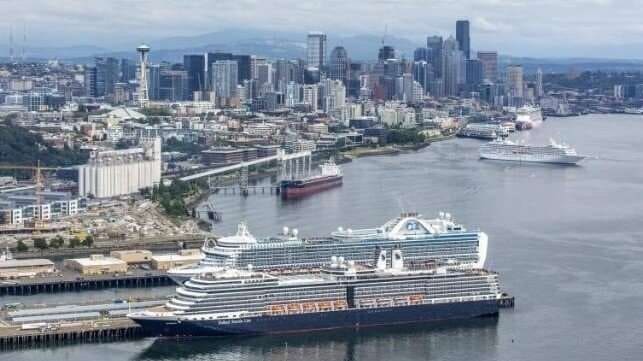TRUMP MANDATES ENGLISH FOR TRUCKERS, IMPORT DELAYS EXPECTED THIS WEEK
In a significant development for the trucking industry, President Trump is set to sign an executive order requiring all truck drivers in the United States to demonstrate proficiency in English.This move is hailed as a step toward improving safety in the transportation sector but is expected to have far-reaching implications for trucking capacity nationwide. A truck weighing 80,000 pounds traveling on the highway with a driver unable to read signs or understand regulations poses significant safety risks. While this may lead to a more efficient “right-sizing” of the sector, it will likely create short-term challenges as the industry adapts to the new requirements. This week marks a critical juncture, as U.S. ports are experiencing a noticeable decline in container ships and cargo volumes. The slowdown will first affect West Coast ports like Los Angeles and Long Beach, where officials told FreightWaves they expect a 35% drop in container volumes in the coming weeks. The combination of these factors—a potential reduction in truck drivers due to the language proficiency requirement and a decrease in incoming cargo—could create market volatility, first with the status of many truck drivers in question and second with the slowdown in cargo from imports.
CMA CGM BECOMES FIRST LARGE CARRIER TO REGISTER CONTAINERSHIP IN INDIA
Supporting the Indian government’s ambitions to build the country’s role in international shipping, CMA CGM Group today marked the transfer of one of its ships to the Indian register. India which is already home to many seafarers wants to develop its shipping operations and expand its shipbuilding industry to more international shipping.CMA CGM was one of several major shipping companies including also Maersk and MSC Mediterranean Shipping to express interest in India.That fee applies if it’s higher than alternate charges of $120 for each container unloaded, increasing to $250 after three years. The company is also looking at India’s shipbuilding and repair operations and already has investments in terminals located at Nhava Sheva Freeport, near Mumbai, and Mundra Port. However, the news outlet says CMA CGM will soon transfer a second vessel CMA CGM Manaus (built in 2009 and 2,592 teu) from the flag of Malta to India. CMA CGM in its announcement said three more vessels after the CMA CGM Vitoria will be transferred in the coming months to the Indian flag.

ZIM ORDERED TO PAY SAMSUNG $3.7M FOR US DEMURRAGE VIOLATIONS
Israeli carrier ZIM has been ordered to pay about $3.7m to Samsung Electronics America (SEA) for violating the US Shipping Act.The American affiliate of the Korean manufacturing giant filed a complaint with the Federal Maritime Commission (FMC) in October 2022, claiming Zim engaged in “unreasonable practices, retaliation, refusal to deal, and improper invoices for home appliance products shipped to the US”. Samsung had sought damages of over $12m – $10.8m for D&D charges plus $1.4m in additional costs.The majority of these shipments occurred prior to the Ocean Shipping Reform Act (OSRA), passed in 2022 and designed to resolve similar disputes quickly.ZIM argued that the accumulation of disputed charges was one of the reasons it imposed multiple cargo holds on SEA’s shipments, preventing it from being delivered and leading to additional demurrage charges; however, FMC ruled this argument to be insufficient. Meanwhile, FMC concluded that SEA has not established that ZIM was responsible for all detention and demurrage charges on door delivery/carrier haulage shipments.“SEA does not present evidence necessary to determine which specific detention and demurrage charges were the fault of ZIM, particularly given that some charges were due to SEA’s customers’ inability to accept deliveries,” it said.
TARIFF AND CUSTOMS TURMOIL MAY POSE THE NEXT BIG FREIGHT FRAUD RISK
The unleashing of tariffs on a vast array of U.S. imports has raised the risk of customs fraud among all segments of the freight transportation supply chain, according to a fraud and compliance expert. “Any time there are trade disruptions, the fraudsters may prey on the vulnerabilities of the rapid change and take advantage of the situation,” Reddy told FreightWaves in an interview. “Especially with the tariffs being so steep, companies and individuals might be inclined to figure out how they’re going to meet their costs by reporting something lower than what’s actually there. Fraud and cargo theft in the supply chain has been an increasing concern for private companies involved in moving goods, notably among trucking companies, railroads and freight brokers. With the sharp increase in tariffs and new reciprocal tariffs, importers may be tempted to avoid them by either underreporting the amount of the products being imported or purposely reporting a different country of origin that has a lower tariff. While importers and customs brokers are more likely to be held directly liable in customs fraud cases, carriers can’t turn a blind eye, Reddy said.